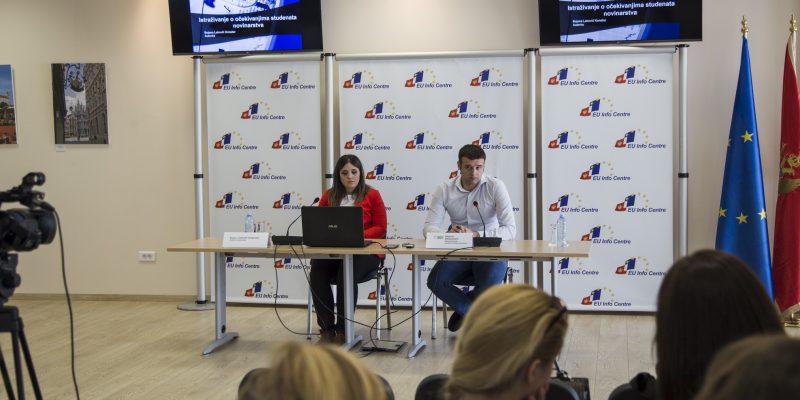Study reveals one-third of Montenegrin journalism students don’t want to work in the media

A survey carried out by the EFJ affiliate in Montenegro, the Trade Union of Media of Montenegro (SMCG), about the exptectations of journalism students in Montenegro showed that a majority of respondents do not plan to work as a journalist after their studies.
Almost 90% of surveyed students believe that getting a job in the profession will not be easy. About a third of Montenegrin journalism students do not see themselves working in this profession in the future – instead they see themselves in public relations (PR) or some other jobs.
“Half of the journalism students would love to work at TV stations, and a third would like to deal with entertainment topics,” said the author of the study, Bojana Laković Konatar.
The survey found that 45% of students enrolled to study journalism because they wanted to be socially engaged, and 43% because it is their “dream job”. Only 7% were motivated by the salary. This shows students have a high opinion of journalism although they do not perceive it as profitable. They are guided more by the desire to change something and to work in the public interest than by personal gain.
Despite a passion for journalism, students are pessimistic about the possibility of employment. 62% of the respondents indicated that graduate journalists have only a partial possibility to be employed in the profession. Almost a third of the respondents (27%) said that, for graduate journalists, the opportunities for employment in the profession were very low. Only 11% of respondents believe that they will have good opportunities for employment.
When it comes to expectations of future jobs, half of the students hope they will be able to advance in their career and earn enough for a “normal” life. Regarding the position of journalists in Montenegro, more than half of the respondents consider it unsatisfactory or bad (51%), while 42% rated the position of journalists as “neither good nor bad”, and only 7% say that it is very good or satisfactory.
“When it comes to the expectations from their studies, the largest proportion of students expect to become trained in media work (40%), 26% expect to establish contacts while studying at university and to find a job in the profession – this is most expected by first-year students. Twelve percent of the questioned students, mostly from the second and third years have no expectations,” stated Bojana Laković Konatar.
Most journalism students had practical experience in the media and were satisfied with that experience. 43% of respondents rated their practical experience as good or very good. Half of the surveyed students wanted to continue to work in journalism after graduating (45%). Still, 17% of them want to transfer to PR and 12% to find a job in another area. Also, 16% point out they will not insist on staying in the profession, but will work in any area in which they can find a job.
When it comes to assessing the answers according to the year of study, it is mostly first-year students that want to continue to work in journalism. Those who want to shift over to PR are mostly students in their second and third year of study. The research has shown that it is mainly those who are satisfied with their practical experience that want to be involved in journalism. On the other hand, the majority of those who want to shift to PR are students who rated their practical experience as bad.
If they could choose, half of the students would like to work at a TV station, while print media features in second place. Next are portals, while the smallest numbers of students would like to try radio journalism. Students were asked to indicate which areas they would like to be involved with the most – of most interest to them are social and cultural topics. It is interesting that a large number of respondents indicated entertainment topics as their future interest (36%), rather than politics (32%). A possible reason for this is the fact that in recent years more and more media companies have based their programmes on news related to the show-business.
The survey was conducted via a questionnaire from 10 March to 10 April on a sample of 100 respondents: 25 students from each of the first, second, third and fourth years of journalism studies at the Faculty of Political Sciences of the University of Montenegro. This equals a half of the total number of enrolled students per study year.
Photo Credit: SMCG






